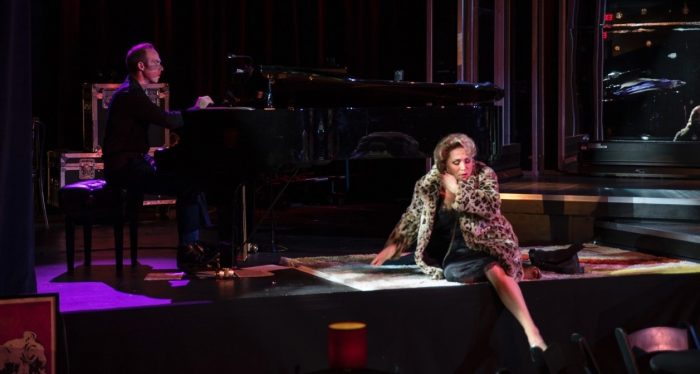
Poulenc: Ne Quittez Pas, A Reimagined La voix humaine. Opera Philadelphia as part of its Festival O18, September 2018.
The appearance of Francis Poulenc’s La voix humaine in this year’s Opera Philadelphia festival was welcome. But not the new work which was an accompanying piece.
Poulenc composed La voix humaine (“The Human Voice”) in 1958 in consultation with Jean Cocteau and singer-actress Denise Duval, based on Cocteau’s 1928 novel of the same name. It’s a work for soprano and orchestra consisting of a woman’s last phone conversation with her lover who’s now involved with someone else. The composition achieved fame for its dramatic revelation of a woman’s tortured soul, and for its emotional music by a man praised for his depictions of females in songs and operas.
It’s a personal testament because both Poulenc and Duval admitted that they abused sleeping pills and anti-depressants, and their character says that she tried to commit suicide with pills. The role is associated with performers known for dramatic acting as well as singing.
I’m not a purist, and enjoyed La voix humaine even without orchestra (using a piano version by the composer.) Yet I was exasperated by the prequel.
We can understand the need to add something to this 45-minute composition to fill out an evening. The re-imagination by James Darrah is called Ne Quittez Pas, which means “Don’t leave” or “Stay on the line.” And the script is based on writings by Cocteau. So far, so good. But Poulenc and Cocteau are known for their urbane, sophisticated styles, and that’s not the tone of the prologue. Instead, Darrah has constructed a grungy rock-club atmosphere with crude characters, including a young brother and sister who play sexual games with a man and with each other, and who engage in bondage and sado-masochism. Supposedly, one of these men grows up to be the invisible man on the phone in La voix humaine.
Darrah is a Los Angeles based director and designer. He directed Missy Mazzoli’s opera Breaking the Waves and the premiere, in New York, of her latest opera, Proving Up. About this piece, Darrah says that he didn’t want to “shove an orchestra into a corner somewhere” and he thought a piano was more intimate.
If we could shut our eyes and just listen to the music, the experience would be better. Baritone Edward Nelson sings chansons by Poulenc, with Christopher Allen accompanying on the piano, while acting in the tacky play. To add to the torture, bright searchlights sweep the audience and blind our eyes. The experience seems as if it was designed to appeal to an audience that feels more comfortable in a rock club than in an opera house.
Nelson sensitively sings the subtle miniatures for piano and singer, melancholy and ironic. One example, “Par les portes d’Orkenise veut entrer un charretier…:
“Through the gates a man wants to leave. The sentries ask, ‘What are you taking out of the town?’ He answers, ‘I’m leaving my whole heart behind.’”
Allen adds a lovely rendition of a Poulenc intermezzo. The young couple (Marc Bendavid and Mary Tuomanen) don’t sing, but speak to each other with lines from Apollinaire and Cocteau. Racette makes a walk-on appearance in a black slip and a leopard coat.
In La voix humaine, Racette sings with sensitivity and expression. Her top notes now are edgy, but most of the role lies in the rich middle part of her voice. She is superb in the idiomatic way she delivers the French text. She begs the unheard man on the phone to return; deludes herself into thinking that he will return; is deaf to the obvious fact that he has dumped her. There’s no explanation of why she is taking this phone call in a nightclub instead of alone in her home — which is where Poulenc and Cocteau set it, and which would be much more intimate — except for the fact that the company chose to produce this in an actual rock club.
La voix humaine seems dated. The listener gets impatient with the woman for groveling and begging. And Cocteau’s words are overly melodramatic. In his notes for Poulenc’s score, Cocteau described the bedroom as the site of a murder and the woman as being assassinated. This reminds me that a tale of a woman alone on a phone about to be killed by her husband — Sorry, Wrong Number, a 1943 radio play by Lucille Fletcher and made famous by Agnes Morehead in a solo performance as a woman who overhears a murder plot. (Later made into a movie with Barbara Stanwyck.) Its words sounded more natural, and the woman more sympathetic.
For future consideration, I suggest to Opera Philadelphia that this composition really should be presented with Poulenc’s orchestra. His colleagues Auric and Honegger praised Poulenc’s harmonies and orchestration and, of course, harmonies are better heard with a group of instruments. The composer wrote in the preface of his score, “L’œuvre entière doit baigner dans la plus grande sensualité orchestrale” — “The entire work must bathe in the largest orchestral sensuality.”